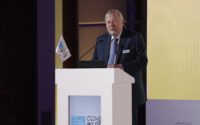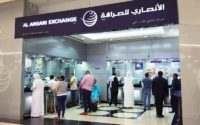COVID-19 Recoveries Increase To 2,090 In UAE, 490 New Cases Identified
Following the complete recovery of 112 patients, the total number of patients in the country who recovered from COVID-19 has increased to 2,090, announced Dr. Amna Al Dahhak Al Shamsi, Official Spokesperson for the UAE government.
Dr. Al Shamsi made the announcement during the UAE Government’s regular briefing on the latest developments related to the spread of coronavirus in the country, which was held today in Abu Dhabi, along with Brig. Dr. Ali Singel, General Health Advisor for Dubai Police.
2,090 recoveries in the country Dr. Al Shamsi revealed the plan to continue expanding testing for COVID-19 in the country. The health sector conducted 29,984 new COVID-19 tests, resulting in the detection of 490 new cases across various nationalities. The total number of cases in the country has now reached 10,839. The number of new COVID-19 patients, who are still receiving medical treatment, is 8,667 across different nationalities.
The new cases were identified after the ministry intensified screening for COVID-19 and expanded testing among those who were in contact with the previously confirmed patients, said MoHAP in a statement this evening.
The ministry also announced that there were six deaths across various nationalities, taking the number of deaths in the country to 82. She offered her heartfelt condolences to the families of the deceased and prayed to Allah the Almighty to grant them solace and patience.
Control system for food processing facilities During the briefing, Dr. Al Shamsi stressed that the UAE had takes steps to ensure food safety across all stages from production to distribution and that all food processing facilities such as restaurants, bakeries, etc. are subject to a government food safety control system that requires the presence of an accredited health supervisor.
Employees at food processing facilities are required to obtain training certificates approved by food safety departments in the municipalities of the country, the most important of which is the “HACCP” certificate, which guarantees the safety of the food industry and confirms that it is completely free from all kinds of pollutants.
She indicated that such health and safety control systems for food do not apply to meals that are cooked at home and that exchanging meals among families in different homes is not recommended during these times, to ensure the safety and health of everyone and avoid infection through the tools and utensils used.
Dr. Al Shamsi noted that the distribution of meals cooked at home to individuals in the community is not allowed and that it is necessary to communicate with charitable organisations in the country that safely handle the cooking and distribution of food to hundreds of persons during the Holy Month of Ramadan.
Precautionary measures and employment support in the UAE Dr. Al Shamsi affirmed that the UAE is a nation of tolerance, brotherhood and giving, and is home to more than 200 nationalities. When it was seen that a large segment of labourers was affected by the precautionary measures, dozens of federal and local government departments, in implementation of the directives of our wise leadership, were keen to mitigate the repercussions and provide them with all kinds of material support and care.
The government departments concerned with employment in the UAE launched awareness campaigns that included lectures and workshops in different languages on the prevention of the coronavirus, methods of transmission and how to protect themselves and other health advice.
Awareness leaflets were also distributed to workers and educational films in several languages were shown on how to comply with health procedures and public health rules while emphasising the importance of hygiene and sterilisation.
The precautionary and preventive measures required restrictions on the movement of some workers, and government and charitable organisations unified efforts to ensure the living and health requirements at their places of residence, including distributing hundreds of sterilisers and face masks, as well as food supplies and integrated food bags.
Dr. Al Shamsi also mentioned that His Highness Sheikh Mohammed bin Rashid Al Maktoum, Vice President and Prime Minister of the UAE and Ruler of Dubai, and H.H. Sheikha Hind bint Maktoum bin Juma Al Maktoum, Chairperson of the Board of Trustees of the UAE Food Bank, directed the implementation of the “10 Million Meals” campaign, the UAE’s biggest community campaign, which enables individuals and institutions to make financial and in-kind donations towards providing food support in the form of 10 million meals or food parcels during Ramadan to financially distressed people amid the outbreak of the virus.
The authorities were also keen to carry out inspection visits to the residential complexes of workers and to ensure their commitment to complying with the precautionary measures, the cleanliness and sterilisation of cooking places and dining halls, and inspection visits to shops and clinics frequented by the workers, as well as the buses used to take them to their work sites.
Dr. Amna highlighted the UAE government’s keenness to protect the health of workers, by offering them testing, treatment and basic health services, and obligating companies and business owners to provide them with health insurance and cover diagnosis and treatment expenses.
The UAE Government will also cover the diagnostic and treatment costs of workers suffering from coronavirus, and the Emirates Red Crescent, ERC, announced that it will fully support people infected with the virus and their families, as well as the families of those who died killed of the disease, she added.
She also explained that the UAE is one of the first Arab countries to implement a series of regulatory measures to manage the relationship between employers and workers to safeguard the rights of both parties, in light of the repercussions of the crisis, noting that Emirati law requires employers to pay the required amount of money to terminated employees and buy their return tickets.
Healthy lifestyle in the new coronavirus era Brigadier Dr. Ali Singel, General Health Adviser for Dubai Police, reviewed several health advisories, in light of the current circumstances the world is going through, stressing that health is a crown on the heads of people, which only the sick can see. “The study has shown that living a healthy life can help the elderly avoid illness and infection. This is what we observed during the coronavirus crisis when many healthy old people overcame the virus more effectively” Dr. Singel said.
Only four out of every 1,000 people practicing a healthy lifestyle suffered from illness “Excess weight exposes a person to future diseases. We noticed that children suffer from obesity due to excessive eating and lack of exercise. If we do not monitor their actions and their promises to be active and eat healthily, they can be exposed to chronic diseases, such as diabetes,” Dr. Singel added.
“For example, those suffering from obesity and chronic diseases are more likely to deteriorate in health if infected by the coronavirus while those leading a healthy lifestyle are more resistant and recover faster,” he further added.
Singel noted that only four out of every 1,000 people who exercise and follow a healthy lifestyle suffer from complications caused by the disease and deaths caused by chronic diseases are linked to an unhealthy lifestyle.
Smokers vulnerable to complications caused by coronavirus Dr. Singel also said that smoking is very harmful to health, especially for the respiratory system. “We noticed that many young people are watching “El-Madawekh” on YouTube excessively, and sometimes psychological pressures can make people increase smoking, and their families may be exposed to second-hand smoke. We also noticed that many coronavirus patients that experienced complications were smokers,” he further added.
Stress, fear weaken the immune system Dr. Singel explained that stress, fear, anxiety and panic affect the body and cause symptoms such as headaches, a high heart rate and shortness of breath. “Therefore, caution is required. Fear must be rejected, as it weakens the immune system. With caution, wisdom and peace of mind, immunity is strengthened. To counter any infection, we need a strong immune system, and most people with strong immunity rarely have any symptoms,” he continued.
Excessive eating can negatively affect digestive system, body as a whole In the same context, Dr. Singel said, “A healthy, balanced and high-fibre diet, such as one with vegetables, fruits and seeds, and avoiding sugars and fats will considerably strengthen the body and make it healthier and resistant to diseases. During the pandemic, we must eat moderately, because excessive eating can negatively affect the body.”
Dr. Singel also emphasised that exercise is necessary and every person is different from another and is suited to certain exercises, adding that the correct exercise will strengthen the body and promote blood circulation and immunity, and an athletic person is more resistant to infections, so everyone should exercise.
Anger, anxiety and other psychological issues also matter, as they damage the mind and heart and affect the body and cause negative side effects, such as hormonal imbalances and breathing difficulties, he added, noting that anyone suffering from constant stress is likely to suffer from infections because their immune system is weaker.
He also explained that sleep is important, and every person must get enough hours of sleep, adding that a lack of sleep is an enemy of the body and can make a person lose focus, therefore, weakening the body and immunity and exposing a person to infection.
Dr. Singel stressed that society as a whole has a major role in maintaining the health systems of all countries during the coronavirus pandemic and individuals are required to adhere to instructions for the safety of everyone because health is an integrated system between the service provider and its recipients.
“Awareness is required and society must promote health awareness. We, as a family, must sit together and decide our future priorities, and our country needs us,” Dr. Singel said in conclusion.






